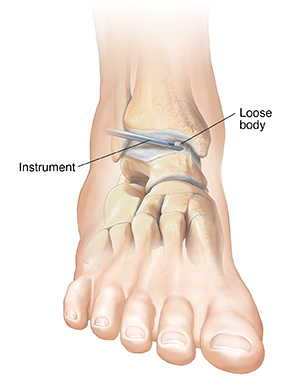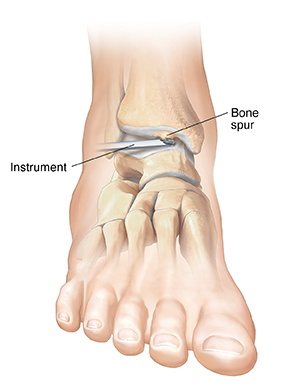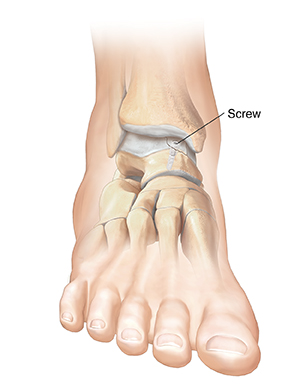Ankle Arthroscopy: Conditions Treated
Arthroscopy is used to find and treat many types of ankle problems. These include loose bodies, bone spurs, osteochondritis dissecans (OCD), and synovitis.
Loose bodies
Loose bodies are bone or cartilage fragments that have chipped off inside the joint. If left in place, they can damage the joint surface, cause pain, and restrict ankle movement. Your surgeon can remove loose bodies from the joint. This will help restore normal, smooth ankle motion.

Bone spurs
When the bones in a joint pinch each other, they are impinged. This problem is often caused by bone spurs (growths) that have formed on the joint. Pressure from the spur may cause pain when you move your ankle. Your surgeon will remove the spur and smooth the bone surface.

Osteochondritis dissecans (OCD)
OCD happens when a small piece of bone becomes loose inside the joint. It can happen from trauma or without any obvious cause. OCD can cause pain and swelling. The surgeon can remove the bone or secure it in place. Open surgery may also be needed. If the bone piece is removed, your surgeon may try to stimulate healing by drilling or by putting holes into the remaining exposed bone.

Synovitis
If the lining of the joint (synovium) is pinched, it may become inflamed. This can cause pain and swelling in the ankle. The surgeon can remove the pinched synovium and relieve symptoms.
Online Medical Reviewer:
Raymond Turley Jr PA-C
Online Medical Reviewer:
Stacey Wojcik MBA BSN RN
Online Medical Reviewer:
Thomas N Joseph MD
Date Last Reviewed:
8/1/2022
© 2000-2024 The StayWell Company, LLC. All rights reserved. This information is not intended as a substitute for professional medical care. Always follow your healthcare professional's instructions.